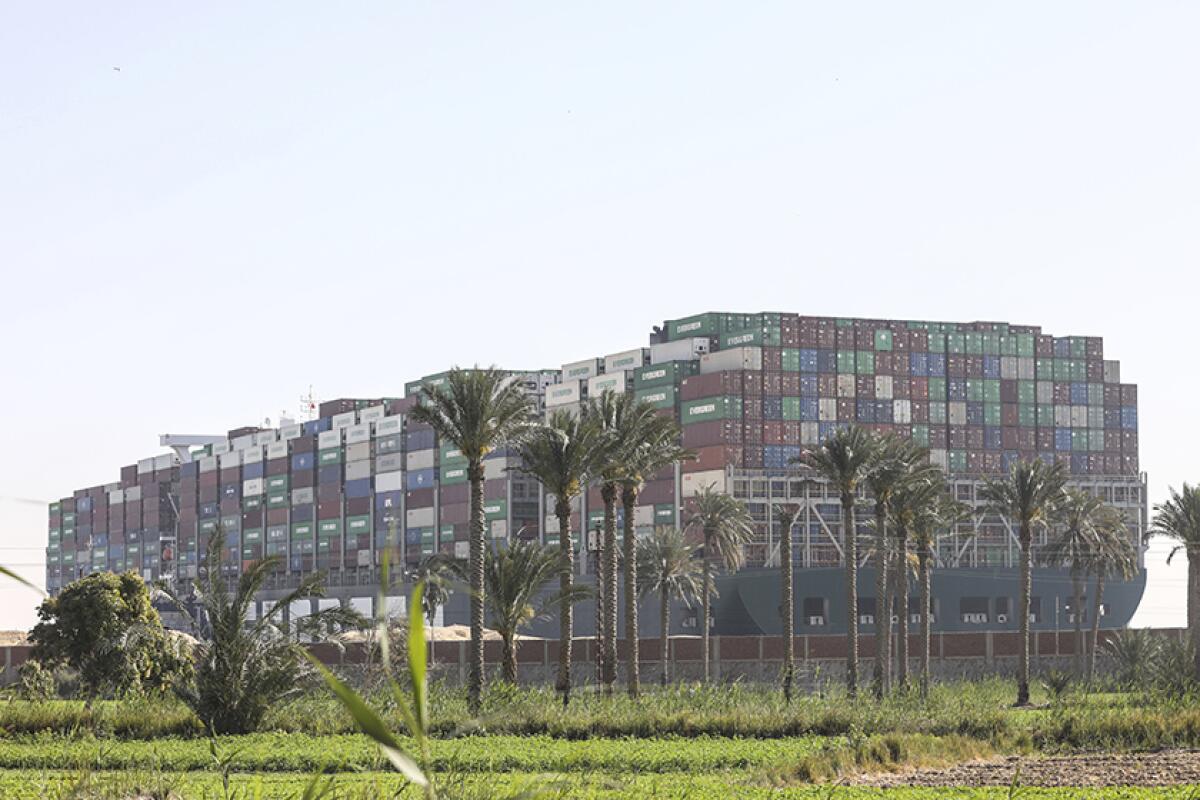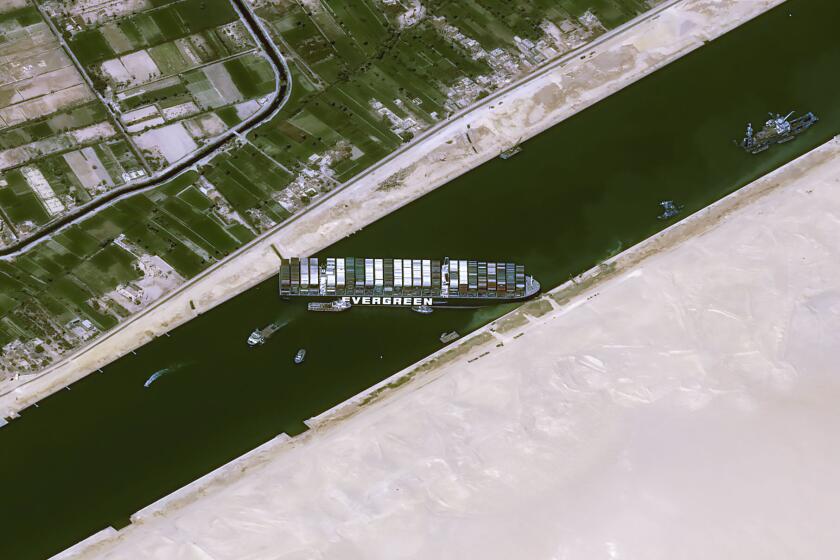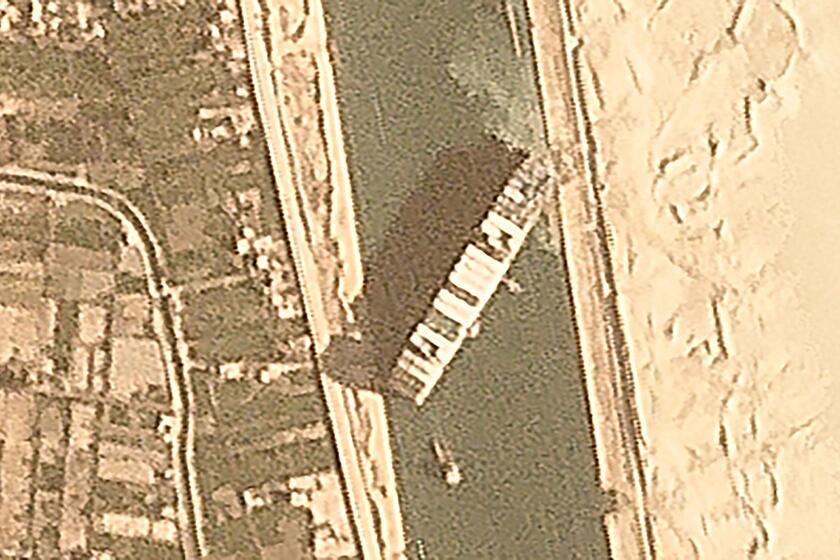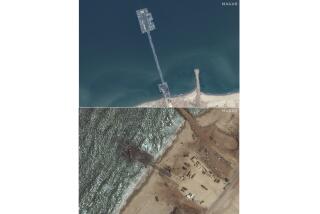No timeline given for extracting wedged ship from Suez Canal

- Share via
SUEZ, Egypt — A giant container ship remained stuck sideways in Egypt’s Suez Canal for a fifth day Saturday as authorities made new attempts to free the vessel and reopen the crucial waterway.
Meanwhile, the head of the Suez Canal Authority said strong winds were “not the only cause” for the Ever Given running aground on Tuesday, appearing to push back against conflicting assessments offered by others. Lt. Gen. Osama Rabei told a news conference Saturday that an investigation was ongoing but did not rule out human or technical errors.
The Ever Given, a Panama-flagged ship that carries cargo between Asia and Europe, ran aground in the narrow canal that runs between Africa and the Sinai Peninsula. The massive vessel got stuck in a single-lane stretch of the canal, about 3.7 miles north of the southern entrance, near the city of Suez.
Rabei said he could not predict when the ship might be dislodged. A Dutch salvage firm is attempting to refloat the vessel with tugboats and dredgers, taking advantage of high tides.
Rabei said he remained hopeful that dredging could free the ship without having to resort to removing its cargo but added that “we are in a difficult situation, it’s a bad incident.”
The stranded ship in the Suez Canal is the latest incident in the waterway’s dramatic history — one that could cost untold losses in worldwide trade.
Asked about when authorities expected to free the vessel and reopen the canal, he said: “I can’t say because I do not know.”
Shoei Kisen, the company that owns the vessel, said it was considering removing containers if other refloating efforts failed.
Two attempts to free the vessel failed Saturday, according to Bernhard Schulte Shipmanagement, the ship’s management company, and a canal services provider, Leth agencies, despite hopes that a high tide might give the vessel a boost.
Bernhard Schulte had said earlier that “significant progress” was made late Friday at the ship’s stern where its rudder was released from sediment.
It said about a dozen tugboats were working Saturday alongside dredging operations that were removing sand and mud from around the left side of the vessel’s bow.
Some 9,000 tons of ballast water had been already removed from the vessel, the canal chairman said.
Since the blockage began, a maritime traffic jam had grown to more than 320 vessels waiting on both ends of the Suez Canal and in the Great Bitter Lake in the middle of the waterway.
Peter Berdowski, chief executive of Boskalis, the salvage firm hired to extract the Ever Given, said the company hoped to pull the container ship free within days using a combination of heavy tugboats, dredging and high tides.
A cargo ship has been wedged in the Suez Canal for two days, sealing off the waterway in a crisis that could have major consequences for global trade.
He told the Dutch current affairs show “Nieuwsuur” on Friday night that the front of the ship is stuck in sandy clay, but the rear “has not been completely pushed into the clay and that is positive because you can use the rear end to pull it free.”
Berdowski said two large tugboats were on their way to the canal and are expected to arrive over the weekend. He said the combination of the tugs, dredging and rising tides, which he said were expected to be up to 20 inches higher Saturday, should help free the ship.
If that doesn’t work, the company will remove hundreds of containers from the front of the ship to lighten it, effectively lifting the ship to make it easier to pull free, Berdowski said.
A crane that can lift the containers off the ship was on its way, he said.
Egypt Prime Minister Mostafa Madbouly called the ship’s predicament “a very extraordinary incident,” in his first public comments on the blockage.
The Suez Canal Authority organized the first media trip Saturday to the site where the vessel was stuck. From a distance, a flotilla of tugboats and other salvage equipment appeared minuscule compared to the vessel, a reminder of the scale of effort needed to reopen the canal.
Bernhard Schulte Shipmanagement said Friday that its initial investigation showed the vessel ran aground due to strong winds and ruled out mechanical or engine failure. However, Rabei seemed to be pushing back against that assessment Saturday, saying that all possibilities, including human and technical errors, were being investigated.
A prolonged closure of the crucial waterway would cause delays in the global shipment chain. Some 19,000 vessels passed through the canal last year, according to official figures. About 10% of world trade flows through the canal, which is particularly crucial for transporting oil. The closure could affect oil and gas shipments to Europe from the Middle East.
Some vessels began changing course and dozens of ships were still en route to the waterway, according to the data firm Refinitiv.
It remained unclear how long the blockage would last. Even after reopening the canal that links factories in Asia to consumers in Europe, the waiting containers are likely to arrive at busy ports, forcing them to face additional delays before offloading.
More to Read
Sign up for Essential California
The most important California stories and recommendations in your inbox every morning.
You may occasionally receive promotional content from the Los Angeles Times.















